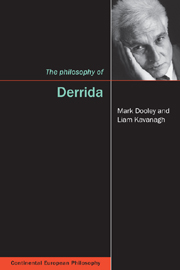Book contents
- Frontmatter
- Contents
- Preface
- Abbreviations
- 1 The catastrophe of memory: identity and mourning
- 2 Death and différance: philosophy and language
- 3 Repetition and post cards: psychoanalysis and phenomenology
- 4 The risks of negotiation: ethics and politics
- Afterword
- Notes
- Suggestions for further reading
- References
- Index
1 - The catastrophe of memory: identity and mourning
- Frontmatter
- Contents
- Preface
- Abbreviations
- 1 The catastrophe of memory: identity and mourning
- 2 Death and différance: philosophy and language
- 3 Repetition and post cards: psychoanalysis and phenomenology
- 4 The risks of negotiation: ethics and politics
- Afterword
- Notes
- Suggestions for further reading
- References
- Index
Summary
Identity and belonging
On the first day of school in 1942, the twelve-year-old Jacques Derrida was expelled from the Lycée de Ben Aknoun, near El-Biar in Algeria. Two years previously, in October 1940, the French citizenship that had formerly been granted to Algerian Jews by the Crémieux Decree of 1870 was abruptly withdrawn. And when segregation laws were subsequently introduced in Algeria in March 1941, all Jews were prohibited from working in the liberal professions, and Jewish children were expelled from elementary and secondary schools to meet segregationist quotas. The decision by the Vichy administration at once denied the Jewish community their right to citizenship and identity, while cynically unleashing the officially sanctioned anti-Semitism that followed. Without warning or explanation, the young “Jackie” Derrida, “a little black and very Arab Jew” (C: 58), suddenly found himself exposed to the violent trauma of exclusion and non-belonging.
The memory of this event would have a profound effect on the young Derrida. Henceforth, he had no sense of self. He had neither language nor tradition, and was an exile in his own community, a fact highlighted in the following reflection:
From that moment, I felt – how to put it? – just as out-of-place in a closed Jewish community as I did on the other side (we called them “the Catholics”). In France, the suffering subsided. At nineteen, I naively thought that anti-Semitism had disappeared, at least there where I was living at the time.[…]
- Type
- Chapter
- Information
- The Philosophy of Derrida , pp. 1 - 20Publisher: Acumen PublishingPrint publication year: 2006

